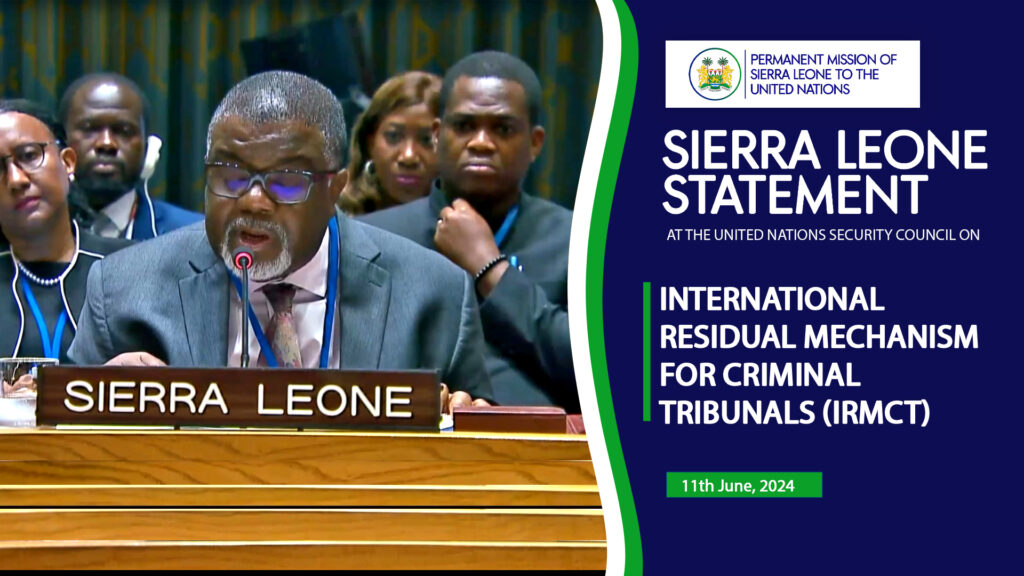BY
H.E. AMARA. S.M. SOWA
CHARGE D’AFFAIRES A.I./
DEPUTY PERMANENT REPRESENTATIVE
Thank you, Mr. President.
I thank Judge Graciela Gatti Santana, President of the International Residual Mechanism for Criminal Tribunals (IRMCT), and Mr. Serge Brammertz, Chief Prosecutor of the IRMCT for briefing the Council as part of the fifth review of the progress of the work of the IRMCT.
On behalf of the Chair of the Informal Working Group for International Tribunals, His Excellency Dr. Michael Imran Kanu, the Representative of Sierra Leone to the Security Council, let me also thank his predecessor, His Excellency Michel Xavier Biang of Gabon, for his excellent work as past Chair.
I also wish to thank the current members of the Working Group, who have applied themselves assiduously to the review task entrusted to Working Group, in reaching agreement on the Statement of the President of the Council adopted on 4 March 2024 S/PRST/2024/1.
I welcome the participation of the representatives of Bosnia & Herzegovina, (Croatia TBC), Serbia and Rwanda in this meeting.
Mr. President,
A fundamental requirement for the maintenance of peace and security is ensuring that those responsible for serious crimes of international concern are held responsible and accountable.
Sierra Leone, by virtue of its own successful transitional justice history, achieved through partnership with the United Nations and in particular the Security Council, and now an elected member of the Council can attest to the transformative power of international justice delivered through independent, and impartial criminal tribunals like the IRMCT, and in our case the Special Court for Sierra Leone.
We therefore express our commitment to support the
IRMCT in the discharge of its important mandate.
We are particularly grateful as a country for the support that the IRMCT provides to the Residual Special Court of Sierra Leone (RSCSL). In our commitment to safeguarding the integrity of the RSCSL and the legacy of the Special Court for Sierra Leone, we are of the firm view that a merger of the activities of the Mechanism and the RSCSL is impracticable and not desirable. We, however, continue to look forward to cooperation between the two mechanisms that can provide opportunity for the exchange of best practices and further advance operational efficiencies.
We commend the Mechanism for the excellent work completed over the review period from 2022 to 2024, during which they concluded the trials of all core crimes and concluded their work with the tracking of fugitives. We thank those States which cooperated with the Mechanism and rendered the necessary assistance to it, enabling the Mechanism to achieve its important mandate. We also applaud the Mechanism’s efforts to eliminate the duplication of functions among its organs which have resulted in further resource optimization. This aligns with the vision as outlined in Security Council resolution 1966 for the Mechanism to be a “small, temporary and efficient structure, whose functions and size will diminish over time, with a small number of staff commensurate with its reduced functions”.
With the conclusion of the key tasks, the Mechanism has now entered into a truly residual stage. Its residual functions now include the monitoring of cases referred to national courts, the protection of victims and witnesses, contempt and false testimony proceedings, review proceedings, non bis in idem, the supervision of the enforcement of sentences, and the provision of assistance to national jurisdictions.
There are many variables that impact the future direction and fulfillment of these functions and we express our commitment to undertake constructive assessment of projections based on possible scenarios.
Mr. President,
We appreciate that uncertainties may arise from the Mechanism’s work, given its heavy reliance on the goodwill and political will of member States. Due to the absence of enforcement States, the Mechanism has had to keep convicted persons in the detention center in The Hague which was not intended for this purpose. Similarly, the Mechanism continues to face challenges in getting States to accept and keep released and acquitted persons. The Mechanism must continue to explore with States along with the States of origin of these persons solutions that would allow for the resettlement of released and acquitted persons in accordance with applicable international legal standards and the rights of such persons.
The Working Group has similarly had to grapple with these same ambiguities as it assesses the work and possible future of the Mechanism. However, even as the Working Group continues to deliberate on the structure, form and tasks that will shape this residual phase, what remains certain is that the Council’s continuing support to the Mechanism is critical to ensuring that it can conclude its mandate to deliver justice for victims in a timely manner and uphold this Council’s commitment to the rule of law.
I Thank you.



